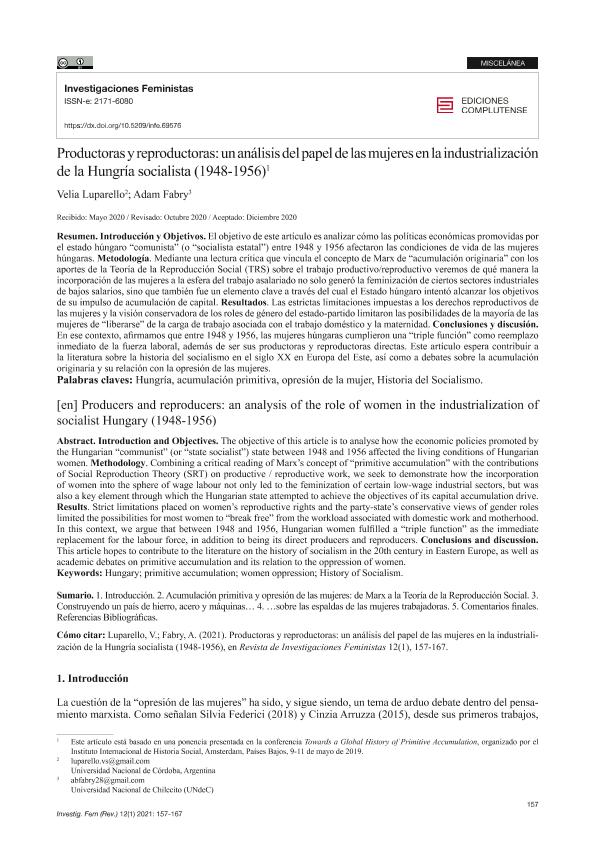Mostrar el registro sencillo del ítem
dc.contributor.author
Luparello, Velia Sabrina

dc.contributor.author
Fabry, Balazs Adam

dc.date.available
2022-10-13T10:51:21Z
dc.date.issued
2021-02
dc.identifier.citation
Luparello, Velia Sabrina; Fabry, Balazs Adam; Productoras y reproductoras: Un análisis del papel de las mujeres en la industrialización de la Hungría socialista (1948-56); Universidad Complutense de Madrid. Instituto de Investigaciones Feministas; Investigaciones Feministas; 12; 1; 2-2021; 157-167
dc.identifier.uri
http://hdl.handle.net/11336/172844
dc.description.abstract
Introducción y Objetivos. El objetivo de este artículo es analizar cómo las políticas económicas promovidas por el estado húngaro “comunista” (o “socialista estatal”) entre 1948 y 1956 afectaron las condiciones de vida de las mujeres húngaras. Metodología. Mediante una lectura crítica que vincula el concepto de Marx de “acumulación originaria” con los aportes de la Teoría de la Reproducción Social (TRS) sobre el trabajo productivo/reproductivo veremos de qué manera la incorporación de las mujeres a la esfera del trabajo asalariado no solo generó la feminización de ciertos sectores industriales de bajos salarios, sino que también fue un elemento clave a través del cual el Estado húngaro intentó alcanzar los objetivos de su impulso de acumulación de capital. Resultados. Las estrictas limitaciones impuestas a los derechos reproductivos de las mujeres y la visión conservadora de los roles de género del estado-partido limitaron las posibilidades de la mayoría de las mujeres de “liberarse” de la carga de trabajo asociada con el trabajo doméstico y la maternidad. Conclusiones y discusión. En ese contexto, afirmamos que entre 1948 y 1956, las mujeres húngaras cumplieron una “triple función” como reemplazo inmediato de la fuerza laboral, además de ser sus productoras y reproductoras directas. Este artículo espera contribuir a la literatura sobre la historia del socialismo en el siglo XX en Europa del Este, así como a debates sobre la acumulación originaria y su relación con la opresión de las mujeres.
dc.description.abstract
Introduction and Objectives. The objective of this article is to analyse how the economic policies promoted by the Hungarian “communist” (or “state socialist”) state between 1948 and 1956 affected the living conditions of Hungarian women. Methodology. Combining a critical reading of Marx’s concept of “primitive accumulation” with the contributions of Social Reproduction Theory (SRT) on productive / reproductive work, we seek to demonstrate how the incorporation of women into the sphere of wage labour not only led to the feminization of certain low-wage industrial sectors, but was also a key element through which the Hungarian state attempted to achieve the objectives of its capital accumulation drive. Results. Strict limitations placed on women’s reproductive rights and the party-state’s conservative views of gender roles limited the possibilities for most women to “break free” from the workload associated with domestic work and motherhood. In this context, we argue that between 1948 and 1956, Hungarian women fulfilled a “triple function” as the immediate replacement for the labour force, in addition to being its direct producers and reproducers. Conclusions and discussion. This article hopes to contribute to the literature on the history of socialism in the 20th century in Eastern Europe, as well as academic debates on primitive accumulation and its relation to the oppression of women.
dc.format
application/pdf
dc.language.iso
spa
dc.publisher
Universidad Complutense de Madrid. Instituto de Investigaciones Feministas
dc.rights
info:eu-repo/semantics/openAccess
dc.rights.uri
https://creativecommons.org/licenses/by/2.5/ar/
dc.subject
HUNGRIA
dc.subject
ACUMULACIÓN PRIMITIVA
dc.subject
OPRESION DE LA MUJER
dc.subject
HISTORIA DEL SOCIALISMO
dc.subject.classification
Otras Humanidades

dc.subject.classification
Otras Humanidades

dc.subject.classification
HUMANIDADES

dc.title
Productoras y reproductoras: Un análisis del papel de las mujeres en la industrialización de la Hungría socialista (1948-56)
dc.title
Producers and reproducers: An analysis of the role of women in the industrialization of socialist Hungary (1948-1956)
dc.type
info:eu-repo/semantics/article
dc.type
info:ar-repo/semantics/artículo
dc.type
info:eu-repo/semantics/publishedVersion
dc.date.updated
2022-08-09T11:37:28Z
dc.identifier.eissn
2171-6080
dc.journal.volume
12
dc.journal.number
1
dc.journal.pagination
157-167
dc.journal.pais
España

dc.journal.ciudad
Madrid
dc.description.fil
Fil: Luparello, Velia Sabrina. Consejo Nacional de Investigaciones Científicas y Técnicas. Centro Científico Tecnológico Conicet - Córdoba. Centro de Investigaciones y Estudios sobre Cultura y Sociedad. Universidad Nacional de Córdoba. Centro de Investigaciones y Estudios sobre Cultura y Sociedad; Argentina
dc.description.fil
Fil: Fabry, Balazs Adam. Universidad Nacional de Chilecito; Argentina. Consejo Nacional de Investigaciones Científicas y Técnicas. Centro Científico Tecnológico Conicet - Córdoba. Centro de Investigaciones y Estudios sobre Cultura y Sociedad. Universidad Nacional de Córdoba. Centro de Investigaciones y Estudios sobre Cultura y Sociedad; Argentina
dc.journal.title
Investigaciones Feministas
dc.relation.alternativeid
info:eu-repo/semantics/altIdentifier/url/https://revistas.ucm.es/index.php/INFE/article/view/69576
dc.relation.alternativeid
info:eu-repo/semantics/altIdentifier/doi/http://dx.doi.org/10.5209/infe.69576
dc.relation.alternativeid
info:eu-repo/semantics/altIdentifier/url/https://dialnet.unirioja.es/servlet/articulo?codigo=7877249
Archivos asociados
